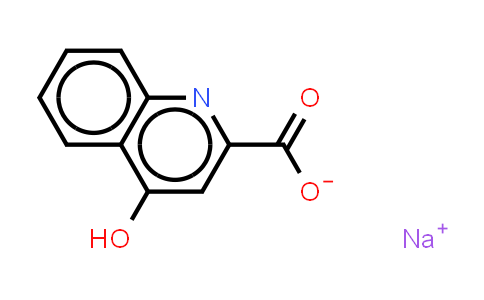
Kynurenic acid (sodium) NLT 98%
Product Number : MC543813
CAS Number : 2439-02-3
Molecular Formula : C10H6NNaO3 | Molecular Weight : 211.15
Quote Request| Purity | NLT 98% |
|---|---|
| Storage | at 20ºC 2 years |
| MolCore specializes in manufacturing high-purity CAS No.2439-02-3, Kynurenic acid (sodium) with the molecular formula C10H6NNaO3 and molecular weight 211.15 delivering critical API intermediates for global pharmaceutical and research industries, certified under ISO quality systems. | |
* The above information is for reference only.
| Chemical Name | Kynurenic acid (sodium) |
|---|---|
| CAS Number | 2439-02-3 |
| MDL Number | MFCD12195841 |
| Molecular Formula | C10H6NNaO3 |
| Molecular Weight | 211.15 |
Kynurenic acid sodium, an endogenous tryptophan metabolite, is a broad-spectrum antagonist targeting NMDA, glutamate, α7 nicotinic acetylcholine receptor. Kynurenic acid sodium is also an agonist of GPR35/CXCR8. IC50 & Target: Target: GPR35[1], NMDA, glutamate, glutamate, α7 nicotinic acetylcholine[2] In Vitro: GPR35 functions as a receptor for the kynurenine pathway intermediate kynurenic acid. Kynurenic acid elicits calcium mobilization and inositol phosphate production in a GPR35-dependent manner in the presence of G qi/o chimeric G proteins. Kynurenic acid stimulates [35S]guanosine 5′-O-(3-thiotriphosphate) binding in GPR35-expressing cells, an effect abolished by pertussis toxin treatment. Kynurenic acid also induces the internalization of GPR35[1]. KYNA’s neuroinhibitory qualities and its neuroprotective and anticonvulsant effects are discovered using concentrations of the compound in the millimolar range. This, as well as the low affinity of KYNA at each of the three ionotropic glutamate receptors responsible for these effects [NMDA, alpha-amino-3-hydroxy-5-methyl-4-isoxazole propionic acid (AMPA) and kainate], together with the realization that KYNA concentrations in the mammalian brain are in the sub-micromolar range, suggested that other receptors might serve as targets of endogenous Kynurenic acid. Kynurenic acid, with a shallower inhibition curve and non-competitively, antagonizes α7nAChRs on cultured hippocampal neurons with an IC50 in the low micromolar range[2]. In Vivo: Kynurenic acid affects the activity of leukocytes in the peripheral blood of mice, although the lowest one (2.5 mg/L) has the most profound influence in contrast to the highest one (250 mg/L), which produces the weakest effect. The lowest Kynurenic acid dose stimulates the proliferative response of T lymphocytes (p<0.05), after 7 and 28 days of administering the acid to the animals[3].
© Copyright 2015-2025 Hangzhou MolCore BioPharmatech Co.,Ltd. All rights reserved.
